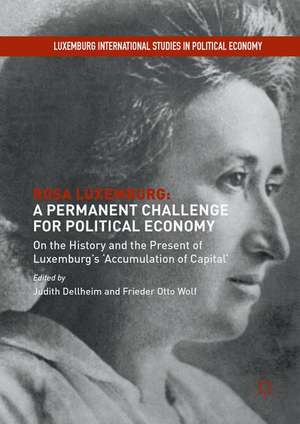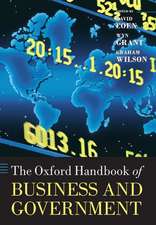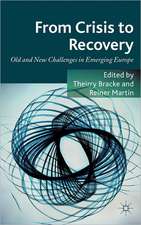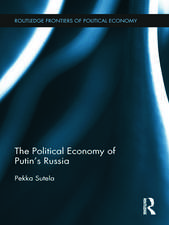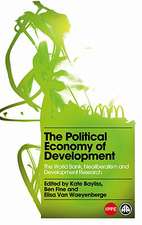Rosa Luxemburg: A Permanent Challenge for Political Economy: On the History and the Present of Luxemburg's 'Accumulation of Capital': Luxemburg International Studies in Political Economy
Editat de Judith Dellheim, Frieder Otto Wolfen Limba Engleză Hardback – 8 sep 2016
By positioning Luxemburg's work in a historical context, this book offers an accessible and timely insight into the significance of The Accumulation of Capital and, more importantly, demonstrates why Luxemburg's legacy should live on.
| Toate formatele și edițiile | Preț | Express |
|---|---|---|
| Paperback (1) | 641.85 lei 6-8 săpt. | |
| Palgrave Macmillan UK – 19 iun 2018 | 641.85 lei 6-8 săpt. | |
| Hardback (1) | 646.43 lei 6-8 săpt. | |
| Palgrave Macmillan UK – 8 sep 2016 | 646.43 lei 6-8 săpt. |
Preț: 646.43 lei
Preț vechi: 760.50 lei
-15% Nou
Puncte Express: 970
Preț estimativ în valută:
123.70€ • 129.41$ • 102.75£
123.70€ • 129.41$ • 102.75£
Carte tipărită la comandă
Livrare economică 02-16 aprilie
Preluare comenzi: 021 569.72.76
Specificații
ISBN-13: 9781137601070
ISBN-10: 1137601078
Pagini: 356
Ilustrații: XXV, 355 p. 6 illus.
Dimensiuni: 148 x 210 x 26 mm
Greutate: 0.59 kg
Ediția:1st ed. 2016
Editura: Palgrave Macmillan UK
Colecția Palgrave Macmillan
Seria Luxemburg International Studies in Political Economy
Locul publicării:London, United Kingdom
ISBN-10: 1137601078
Pagini: 356
Ilustrații: XXV, 355 p. 6 illus.
Dimensiuni: 148 x 210 x 26 mm
Greutate: 0.59 kg
Ediția:1st ed. 2016
Editura: Palgrave Macmillan UK
Colecția Palgrave Macmillan
Seria Luxemburg International Studies in Political Economy
Locul publicării:London, United Kingdom
Cuprins
1. On the Historical Conditions of Accumulation; Julian Park.- 2. Rosa Luxemburg and Contemporary Capitalism; Greg Albo.- 3. Value: Marx's Evolution and Luxemburg's Legacy; Paul Zarembka.- 4. Rosa Luxemburg and Maxim Kovalevsky; James D. White.- 5. On the Beginnings of Marxian Macro-Economics; Michael R. Krätke.- 6. Tadeusz Kowalik's Interpretation of Accumulation; Jan Toporowski.- 7. Luxemburg and the Balance of Power in the 21st Century; Hanna K. Szymborska.- 8. A Feminist Approach to Primitive Accumulation; Tove Soiland.- 9. Limits to Landnahme: Growth Dilemma as Challenge; Klaus Dörre.- 10. A Critical Reception of Accumulation of Capital; Michael Brie.- 11. Accumulation of Capital for Solidary Ways of Life; Judith Dellheim.
Notă biografică
Judith Dellheim is a senior research fellow at the Rosa Luxemburg Foundation, Berlin, Germany. She worked as a freelance scientific consultant from 2004–10, and has been politically active since her childhood. Her main research interests include the socio-ecological transformation of modern societies, solidarity economy, and political economy.
Frieder Otto Wolf is Honorary Professor of Philosophy at the Free University of Berlin, Germany. He has been a lecturer in philosophy at this institution since 1973, and became Honorary Professor in 2007. He has served as a fellow at the Rosa Luxemburg Foundation and sits on the advisory board of several journals.
Textul de pe ultima copertă
The book is based upon a call for papers and a conference to mark the 100th anniversary of Rosa Luxemburg's principal work, The Accumulation of Capital: A Contribution to an Economic Explanation of Imperialism, published in 1913. Eleven contributors from five different countries come together to discuss different issues and dimensions connected with Luxemburg's work and focus on its continuing relevancy. This collection investigates topics such as, the influences of Karl Marx and Maxim Kovalevsky, the imperialism debate in German social democracy, and the critical reception of Luxemburg's work from Marxist and feminist viewpoints.
By positioning Luxemburg's work in a historical context, this book offers an accessible and timely insight into the significance of The Accumulation of Capital and, more importantly, demonstrates why Luxemburg's legacy should live on.
